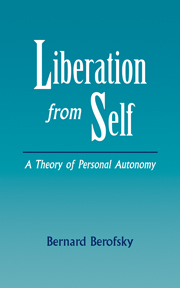Book contents
- Frontmatter
- Contents
- Liberation from self
- 1 Introduction
- 2 Freedom and autonomy
- 3 Freedom of action
- 4 Agent freedom
- 5 Values and the self
- 6 Autonomy and rationality
- 7 Rationality, values, and integrity
- 8 The liberation theory of autonomy: Objectivity
- 9 The liberation theory of autonomy: The place of self
- 10 The value of autonomy
- Notes
- Bibliography
- Index
8 - The liberation theory of autonomy: Objectivity
Published online by Cambridge University Press: 16 September 2009
- Frontmatter
- Contents
- Liberation from self
- 1 Introduction
- 2 Freedom and autonomy
- 3 Freedom of action
- 4 Agent freedom
- 5 Values and the self
- 6 Autonomy and rationality
- 7 Rationality, values, and integrity
- 8 The liberation theory of autonomy: Objectivity
- 9 The liberation theory of autonomy: The place of self
- 10 The value of autonomy
- Notes
- Bibliography
- Index
Summary
The picture of the autonomous agent that has evolved so far incorporates the following elements: (1) Freedom: an autonomous agent possesses a variety of intellectual and physical skills and capacities which confer upon him the further capacity to assess his options competently. His autonomy is enhanced by a strong rational will. (2) Values: an autonomous agent has and acts on values, but it is not necessary that these values be understood as the Evaluative Theory demands. That is, he is not necessarily disposed to evaluate his desires and options from a moral point of view or from the point view of the worth of his motivations. (3) Rationality: an autonomous agent is basically rational. He possesses rational powers and is generally disposed to use these powers in decision making, even though he may retain and occasionally act on the power to flout rational principles. (4) Independence: the procedures and principles of decision making adopted by an autonomous agent are held by that agent on the grounds of their reliability in the process of decision making. Regardless of origin, they are subject to evaluation in terms of criteria that are as objective as possible. Although an autonomous agent may enter relationships which entail (self-imposed) limitations, he does not thereby abandon either his ultimate capacity for or his right to rational review.
- Type
- Chapter
- Information
- Liberation from SelfA Theory of Personal Autonomy, pp. 182 - 209Publisher: Cambridge University PressPrint publication year: 1995



